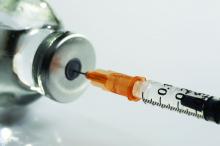The administration of pediatric vaccinations in close proximity to factor VIII (FVIII) exposure was not associated with inhibitor development in previously untreated patients with severe hemophilia A in the PedNet Registry.
Of 232 patients from the registry who received vaccinations within 48 hours before or 24 hours after FVIII exposure, 38 (16.4%) developed inhibitors, compared with 39 (27.3%) of 143 who did not receive vaccinations within that time frame (adjusted hazard ratio for any inhibitor development related to vaccinations in close proximity to FVIII, 0.65), according to H. Marijke van den Berg, MD of University Medical Centre, Utrecht, The Netherlands.Similarly, no association was seen between recurrent vaccinations and inhibitor development, Dr. van den Berg reported at the annual meeting of the European Association for Haemophilia and Allied Disorders.
Inhibitor development in this patient population is a multifactorial event, but these findings show no association between vaccinations administered early in life and increased inhibitor risk, she concluded.
Dr. van den Berg received grant/research support from Bayer, Baxalta, Pfizer, CSI, and Grifols.


